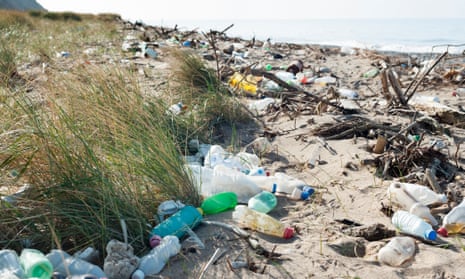The chancellor, Philip Hammond, will announce in next week’s budget a “call for evidence” on how taxes or other charges on single-use plastics such as takeaway cartons and packaging could reduce the impact of discarded waste on marine and bird life, the Treasury has said.
The commitment was welcomed by environmental and wildlife groups, though they stressed that any eventual measures would need to be ambitious and coordinated.
An estimated 12m tonnes of plastic enters the oceans each year, and residues are routinely found in fish, sea birds and marine mammals. This week it emerged that plastics had been discovered even in creatures living seven miles beneath the sea. The introduction just over two years ago of a 5p charge on single-use plastic bags led to an 85% reduction in their use inside six months.
Separately, the environment department is seeking evidence on how to reduce the dumping of takeaway drinks containers such as coffee cups through measures such as a deposit return scheme.
Announcing the move on plastics, the Treasury cited statistics saying more than a million birds and 100,000 sea mammals and turtles die each year from eating or getting tangled in plastic waste.
The BBC series Blue Planet II has highlighted the scale of plastic debris in the oceans. In the episode to be broadcast this Sunday, albatrosses try to feed plastic to their young, and a pilot whale carries her dead calf with her for days in mourning. Scientists working with the programme believed the mother’s milk was made poisonous by pollution.
The call for evidence will begin in the new year and will take into account the findings of the consultation on drinks containers.
Tisha Brown, an oceans campaigner for Greenpeace UK, said the decades-long use of almost indestructible materials to make single-use products “was bound to lead to problems, and we’re starting to discover how big those problems are”.
She said: “Ocean plastic pollution is a global emergency, it is everywhere from the Arctic Ocean at top of the world to the Marianas trench at the bottom of the Pacific. It’s in whales, turtles and 90% of sea birds, and it’s been found in our salt, our tap water and even our beer.
“The Treasury’s announcement is only a statement of intent, but it recognises the significance of the problem and the urgent need for a solution. There is a long way to go, but hopefully this is the beginning of the end for single-use plastic.”
Jeff Knott, head of nature policy for the RSPB, noted how Blue Planet was “seeing attention turned to the manmade threats the marine world faces”.
He said: “Sadly our marine life is in trouble. Through the mismanagement of our waters with fishing, pollution and littering we are seeing declines in many important marine species as well as those that depend on them.
“A tax on single-use plastics is a welcome move, but we must also recognise more needs to be done to tackle the often less visible threats.”
After the Brexit vote, Knott said, the UK had “a strong interest in demonstrating global leadership in tackling this international problem that impacts not just on our shores and our overseas territories but every coastline around the world. However, this must be part of a bigger package of measures that also looks at overfishing, lack of protection, climate change and pollution.”
Mike Barrett, director of science and policy for the wildlife charity WWF, said: “Too often birds, fish, turtles and whales are found dead having eaten plastic. Plastic is suffocating our seas.
“Any action to tackle single-use plastic is a good thing, but we must ensure any action is truly ambitious if we want to make the real difference needed to help save the planet.”









